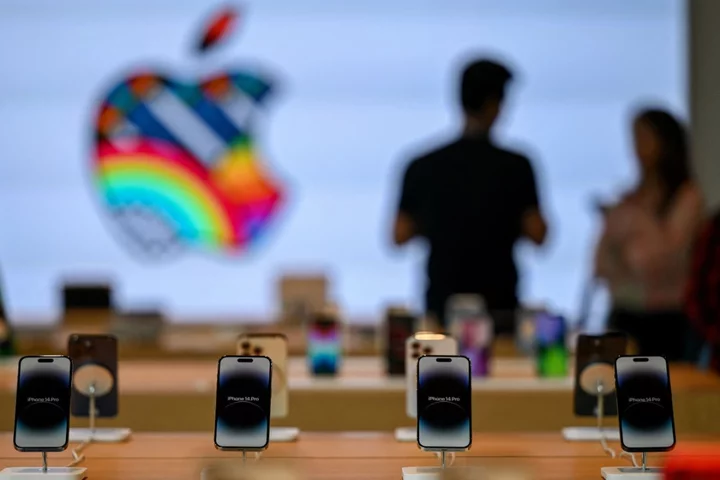
Police spread baseless panic with warning over new iPhone feature
Police across the US have sent out privacy warnings over a new iPhone feature added in the latest Apple update. But the tool – called NameDrop – is a simple way of sharing personal information with consent, and includes a number of protections to ensure that data is not stolen. In a host of warnings from law enforcement, shared largely across Facebook, police departments warn about a possible “privacy” concern from the NameDrop feature, which arrived in iOS 17. The warning was shared by a range of different law enforcement authorities on Facebook, right across the country. It appears to have caught on over the Thanksgiving weekend. It notes that the feature defaults to being on, which is true. But it also suggests that “many people do not check their settings and realise how their phone works” and suggest there is something dangerous about the fact that you can “share your contact information by being next to another iPhone”. As such, it warns that people should turn the feature off by default and do the same for their children. It is true that the feature allows two devices to share contact information when they are next to each other. But they must be right next to each other, rather than simply close – and that is just one of a range of protections built into the feature. Chief among them is that users must specifically unlock their phone and also explicitly opt in to share their data with anyone, rather than it being able to send information on its own. NameDrop was introduced earlier this summer, as part of a number of changes to the way that contacts and sharing work in iOS 17. It is intended to make it easy to quickly share details with someone just by putting your phones near each other, and in so doing avoid having to read out numbers or other more complicated processes. It is used by simply placing two iPhones, two Apple Watches or a combination of the two together. If the devices are unlocked, and then placed within a few centimetres of each other, they will vibrate and glow to the show that the connection is happening. Users are then given the option of what contact information they want to share, as well as what they want to leave out. That gives the option to share only a work number, for instance, or only an email address – or one user can opt out of sharing any data at all, and just receive it. Users then click again to share their details. It can also be cancelled at any time by just swiping from the bottom of the display. NameDrop can be turned off relatively easily if there any concern. That is done by opening the Settings app, clicking on “General” then “AirDrop” and choose the “Start Sharing By” option, where you can turn off the setting to do so by “Bringing Devices Together”. Read More Why Apple is working hard to break into its own iPhones Disney, Apple suspend ads on Musk’s X after he agrees with antisemitic tweet Apple to adopt system to improve texting between iPhones and Android devices
2023-11-29 00:24

A terrifying thing happens to astronauts' fingernails on a spacewalk
Going on a spacewalk might sound like a lot of fun – but in reality it’s no walk in the park. From their muscles getting less dense all the way to erectile dysfunction, astronauts have to put up with all sorts of things going wrong with their body. And none more gross than what happens to their fingernails. Turns out they just fall right off. The technical term for this is onycholysis, and it has to do with how much – or how little – atmospheric pressure there is in space. Because there is so little ambient pressure in space, astronaut’s space suits need to be pressurised to keep the human body intact. But that’s not good for the hands, it turns out. “Injuries to the hands are common among astronauts who train for extravehicular activity (EVA),” says a 2015 conference paper by space specialists Wyle Laboratories. “When the gloves are pressurized, they restrict movement and create pressure points during tasks, sometimes resulting in pain, muscle fatigue, abrasions, and occasionally more severe injuries such as onycholysis. “Glove injuries, both anecdotal and recorded, have been reported during EVA training and flight persistently through NASA's history regardless of mission or glove model." A 2010 study looked at 232 hand injuries sustained by astronauts, and found that the wider your knuckle joints, the more likely you are to suffer in a space suit. The study suggested that because space suit gloves limit the mobility of these knuckles, the fingers then get put under more pressure. This, in turn, means less blood gets to the fingers, and risks onycholysis. Ouch. Work has been done to try to improve the design of space suit gloves, of course. One team found that the more tailored they were to each astronaut’s finger length the less likely they were to lose their fingernails. That’s no mean feat, however. These gloves are made of at least four layers: one which touches the skin, one which helps create the pressurised environment, another one which makes the pressure layer less stiff, and an outer layer which protects the astronaut from everything on the outside. Mercifully for NASA astronauts at least, they usually have their gloves fitted to each wearer, and with new space suit design moving forward each day, the number of injuries is decreasing. Nonetheless, it sounds like a trip to space is no time for a manicure. How to join the indy100's free WhatsApp channel Sign up to our free indy100 weekly newsletter Have your say in our news democracy. Click the upvote icon at the top of the page to help raise this article through the indy100 rankings.
2023-11-28 21:50

New research suggests dinosaurs were wiped out by more than just a meteorite
We’ve all been told the story of what wiped out the dinosaurs – a giant meteor careers down from the sky, crashes into Earth and bang! The rest is history. But what if that wasn’t the whole story? A new study suggests there may have been more to it than just an asteroid – and it involves climate change. A chain of huge volcanic eruptions which eventually cooled the planet an alarming amount may have been partially to blame, according to research. The study, published in Science Advances and co-authored by Don Baker, a professor in McGill University's Department of Earth and Planetary Sciences, suggests that this might be the case. The researchers looked into volcanic eruptions at the Deccan Traps, a huge, rugged plateau that formed when molten lava solidified and turned to rock. The plateau dates back to around 66-65m years ago, when magma from deep inside Earth erupted to the surface. That just so happens to be around the time when scientists think the dinosaurs met their demise. Baker’s team suggest that the eruptions produced a staggering 1m cubic kilometres of lava, which then turned into rock, which may have played a key role in cooling the global climate around 65m years ago. The scientists say it’s all to do with how much sulphur and fluorine was pumped into the atmosphere as a result of the eruptions. Incredibly, they found the event could have sparked a drop in temperature all around the world, dubbed a “volcanic winter”. Baker said: “Our research demonstrates that climatic conditions were almost certainly unstable, with repeated volcanic winters that could have lasted decades, prior to the extinction of the dinosaurs. “This instability would have made life difficult for all plants and animals and set the stage for the dinosaur extinction event. “Thus our work helps explain this significant extinction event that led to the rise of mammals and the evolution of our species.” The scientists worked it out using new chemical techniques developed at McGill to measure how much sulphur is in the rock formations which came about at the time, then from that, figuring out how much went into the atmosphere. The paper is titled “Recurring volcanic winters during the latest Cretaceous: Sulfur and fluorine budgets of Deccan Traps lavas.” How to join the indy100's free WhatsApp channel Sign up to our free indy100 weekly newsletter Have your say in our news democracy. Click the upvote icon at the top of the page to help raise this article through the indy100 rankings.
2023-11-28 21:25

Bitcoin mining could supercharge transition to renewables, study claims
Solar and wind energy installations could earn hundreds of millions of dollars by mining bitcoin during periods of excess electricity generation, according to a new study. Scientists from Cornell University in the US, who conducted the research, said setting up mining operations could reduce the environmental impact of cryptocurrency, while also providing revenue that could be reinvested in future renewable energy projects. “Profitability of a mining system hinges on periods of steady energy availability since renewable energy sources can vary significantly,” said Fengqi You, a professor of energy systems at Cornell University. “Therefore, it is important to site the mining farm strategically to maximise productivity.” The state with the most potential for setting up profitable crypto mining operations is Texas, according to the study, with 32 planned renewable projects capable of generating combined profits of $47 million. California, Colorado, Illinois, Iowa, Nevada and Virginia all showed potential, though setting up mining rigs presents a large initial cost. One way of incentivising such projects, Cornell doctoral student Apoorv Lal suggested, could be the introduction of new policies that provide economic rewards for mining bitcoin and other cryptocurrencies with clean energy ”These rewards can act as an incentive for miners to adopt clean energy sources, which can lead to combined positive effects on climate change mitigation, improved renewable power capacity, and additional profits during pre-commercial operation of wind and solar farms,” Mr Lal said. “We also recommend policies that encourage cryptocurrency-mining operations to return some of their profits back into infrastructure development. This would help create a self-sustaining cycle for renewable energy expansion.” Bitcoin has drawn criticism from environmentalists for the vast amounts of electricity required to support its network and mint new units of the cryptocurrency, with recent analysis from the University of Cambridge estimating that it uses roughly the same amount of electricity as Poland. The plummeting costs of renewable energy mean bitcoin miners are increasingly turning to solar, wind and hydro sources to power their operations. “In its current status, the infrastructure that supports the Bitcoin protocol cannot be sustained, but the beauty of the protocol is that the incentive structure will force miners to adopt the cheapest form of electricity, which in the near future will be renewable energy,” Don Wyper, COO of DigitalMint, told The Independent last year. The latest study, titled ‘From mining to mitigation: how bitcoin can support renewable energy development and climate action’, was published in the journal ACS Sustainable Chemistry & Engineering. Read More Bitcoin mining rate hits all-time high amid record-breaking prediction for 2024 Nasa has received a signal from 10 million miles away Scientists reveal surprise finding from huge study into internet and mental health Nasa has received a signal from 10 million miles away Scientists reveal surprise finding from huge study into internet and mental health Software firm Cloudsmith announces £8.8m investment
2023-11-28 20:53

BlackRock Unveils Path to Unleashing $4 Trillion Investment Boom
Researchers working inside a unit of BlackRock Inc. estimate that a reform of public financial institutions could free
2023-11-28 18:49

Deal-hunters on track to spend $12 billion in US Cyber Monday shopping spree
By Ananya Mariam Rajesh, Deborah Mary Sophia and Siddharth Cavale (Reuters) -Spending online on Cyber Monday is on track to
2023-11-28 09:55

Young people the biggest users of generative AI, Ofcom study shows
Teenagers and children are far more likely than adults to have used generative AI, according to Ofcom’s latest research into the UK’s online habits. The regulator said its latest study showed that four in five (79%) online teenagers aged 13-17 now use generative AI tools – which includes chatbots such as ChatGPT, with 40% of those aged 7-12 also using the technology. Generative AI is capable of creating text, images or other media using learned behaviour. In contrast, Ofcom said only 31% of adult internet users had used the technology – and among the 69% who had never used it, 24% did not know what it was. As online safety regulator, we’re already working to build an in-depth understanding of the opportunities and risks of new and emerging technologies, so that innovation can thrive, while the safety of users is protected Yih-Choung Teh, Ofcom OpenAI’s ChatGPT was named the most widely used generative AI tool by those in the study, with 23% of those aged 16 and above saying they used it. When asked why they use the technology, the majority of those aged 16 and over said for fun (58%), a third said they used it for work, and a quarter said they used it to help with their studies. In addition, 22% said they had used it for seeking advice. Yih-Choung Teh, Ofcom’s group director of strategy and research, said: “Getting rapidly up to speed with new technology comes as second nature to Gen Z, and generative AI is no exception. “While children and teens are driving its early adoption, we’re also seeing older internet users exploring its capabilities, both for work and for leisure.” “We also recognise that some people are concerned about what AI means for the future. “As online safety regulator, we’re already working to build an in-depth understanding of the opportunities and risks of new and emerging technologies, so that innovation can thrive, while the safety of users is protected.” Elsewhere in Ofcom’s study, it said it had found that more than a fifth of those aged 8-17 had a social media profile with a false age of 18 or over, putting them at greater risk of encountering potentially harmful content. It also showed that YouTube had replaced Facebook as the most visited platform by UK adults, according to data gathered during Ofcom’s sample month of May 2023. The report also showed that two-thirds of adults reported they had seen or experienced potential online harms in the previous four weeks, with over a third saying this had appeared on their personalised social media feed, where content is tailored to users by a platform’s algorithm. Read More No ‘smoking gun’ linking mental health harm and the internet – study Software firm Cloudsmith announces £8.8m investment UK and South Korea issue warning over North Korea-linked cyber attacks Data protection watchdog warns websites over cookie consent alerts Employee data leaked during British Library cyber attack Half of adults who chat online with strangers do not check age – poll
2023-11-28 08:29

Scientists release findings from major study into internet and mental health – with surprising conclusion
There is no clear link between mobile phones and the internet and a negative impact on mental wellbeing, the authors of a major new study have found. Researchers took data on two million people aged between 15 and 89, from 168 countries. While they found that negative and positive experiences had both increased, they found little evidence that was the result of the prevalence of the internet. The results from the major study, led by the Oxford Internet Institute, contradict widespread speculation that the internet – and especially its widespread availability through mobile devices – has damaged mental wellbeing. The researchers said that if the link between internet use and poor health were as universal and robust as many think, they would have found it. However, the study did not look at social media use, and although the data included some young people, the researchers did not analyse how long people spent online. Professor Andrew Przybylski, of the Oxford Internet Institute and Assistant Professor Matti Vuorre, Tilburg University and Research Associate, Oxford Internet Institute, carried out the research into home and mobile broadband use. Prof Przybylski, said: “We looked very hard for a ‘smoking gun’ linking technology and wellbeing and we didn’t find it.” He added: “The popular idea that the internet and mobile phones have a blanket negative effect on wellbeing and mental health is not likely to be accurate. “It is indeed possible that there are smaller and more important things going on, but any sweeping claims about the negative impact of the internet globally should be treated with a very high level of scepticism.” Looking at the results by age group and gender did not reveal any specific patterns among internet users, including women and young girls. Instead, the study, which looked at data for the past two decades, found that for the average country, life satisfaction increased more for females over the period. Data from the United Kingdom was included in the study, but the researchers say there was nothing distinctive about the UK compared with other countries. Although the study included a lot of information, the researchers say technology companies need to provide more data, if there is to be conclusive evidence of the impacts of internetuse. They explain: “Research on the effects of internet technologies is stalled because the data most urgently needed are collected and held behind closed doors by technology companies and online platforms. “It is crucial to study, in more detail and with more transparency from all stakeholders, data on individual adoption of and engagement with internet-based technologies. “These data exist and are continuously analysed by global technology firms for marketing and product improvement but unfortunately are not accessible for independent research.” For the study, published in the Clinical Psychological Science journal, the researchers looked at data on wellbeing and mental health against a country’s internet users and mobile broadband subscriptions and use, to see if internet adoption predicted psychological wellbeing. In the second study they used data on rates of anxiety, depression and self-harm from 2000-2019 in some 200 countries. Wellbeing was assessed using data from face-to-face and phone surveys by local interviewers, and mental health was assessed using statistical estimates of depressive disorders, anxiety disorders and self-harm in some 200 countries from 2000 to 2019. Read More Software firm Cloudsmith announces £8.8m investment No ‘smoking gun’ linking mental health harm and the internet – study Young people the biggest users of generative AI, Ofcom study shows Software firm Cloudsmith announces £8.8m investment No ‘smoking gun’ linking mental health harm and the internet – study Young people the biggest users of generative AI, Ofcom study shows
2023-11-28 08:18

Software firm Cloudsmith announces £8.8m investment
A Belfast-based software supply chain management firm has announced an £8.8m investment. Cloudsmith will use the funding to grow operations for its global client base, including leading software companies such as Shopify, PagerDuty, Font Awesome, HP and EnterpriseDB. The funding, led by MMC Ventures, will bolster the firm’s ability to deliver a software supply chain platform. Cloudsmith provides organisations with a single source for managing all their software assets, including datasets required to build the AI products of the future. Recently appointed chief executive officer Glenn Weinstein said the industry demand for software supply chain solutions is surging. He said: “Despite economic headwinds and a slow venture capital funding market, this announcement reaffirms the confidence our investors have in Cloudsmith. “We’ve been successfully disrupting and reinventing the software supply chain market. “This fresh infusion of capital also comes as industry demand for secure and reliable software supply chain solutions is surging. “Cybersecurity attacks of increasing severity have become more frequent, and threaten reputational damage, data exfiltration and IP theft.” The firm’s software supply chain management platform is designed to meet the needs of software teams building for internal use or distributing software packages to the market. It provides a suite of artefact storage, management and distribution solutions, allowing developers and companies to streamline and control their software supply chain, improve collaboration and accelerate product delivery. Belfast is a leading tech hub with a thriving digital economy Glenn Weinstein Mr Weinstein added: “This funding will be used to enhance Cloudsmith’s unique cloud-native software supply chain solution, which is faster, more secure and of higher value than the legacy on-premises vendors we’re displacing. “Cloudsmith is a great choice for companies with software teams distributed in remote locations, and while the US is our largest market, we continue to see increased demand from a range of countries including the UK, Germany and Australia.” He emphasised the strategic importance of its Belfast headquarters which benefits from access to both UK and EU markets. “Belfast is a leading tech hub with a thriving digital economy. “We see this renewed round of investment as a doubling down on Cloudsmith’s commitment to this vibrant city.” Read More Young people the biggest users of generative AI, Ofcom study shows No ‘smoking gun’ linking mental health harm and the internet – study UK and South Korea issue warning over North Korea-linked cyber attacks Data protection watchdog warns websites over cookie consent alerts Employee data leaked during British Library cyber attack Half of adults who chat online with strangers do not check age – poll
2023-11-28 08:16

No ‘smoking gun’ linking mental health harm and the internet – study
The internet and mobile phones may not have a “blanket negative effect” on wellbeing and mental health, researchers say. A large international study used data from two million people aged 15 to 89 in 168 countries, and found smaller associations than would be expected if the internet were causing widespread psychological harm. The researchers say that if the link between internet use and poor health were as universal and robust as many think they would have found it. We looked very hard for a ‘smoking gun’ linking technology and wellbeing and we didn’t find it Professor Andrew Przybylski, Oxford Internet Institute However, the study did not look at social media use, and although the data included some young people, the researchers did not analyse how long people spent online. Professor Andrew Przybylski, of the Oxford Internet Institute, and Assistant Professor Matti Vuorre, Tilburg University, and Research Associate, Oxford Internet Institute, carried out the research into home and mobile broadband use. Prof Przybylski said: “We looked very hard for a ‘smoking gun’ linking technology and wellbeing and we didn’t find it.” He added: “The popular idea that the internet and mobile phones have a blanket negative effect on wellbeing and mental health is not likely to be accurate. “It is indeed possible that there are smaller and more important things going on, but any sweeping claims about the negative impact of the internet globally should be treated with a very high level of scepticism.” Looking at the results by age group and gender did not reveal any specific patterns among internet users, including women and young girls. Instead, the study, which looked at data for the past two decades, found that for the average country, life satisfaction increased more for females over the period. Data from the United Kingdom was included in the study, but the researchers say there was nothing distinctive about the UK compared with other countries. Although the study included a lot of information, the researchers say technology companies need to provide more data, if there is to be conclusive evidence of the impacts of internet use. They explain: “Research on the effects of internet technologies is stalled because the data most urgently needed are collected and held behind closed doors by technology companies and online platforms. “It is crucial to study, in more detail and with more transparency from all stakeholders, data on individual adoption of and engagement with internet-based technologies. “These data exist and are continuously analysed by global technology firms for marketing and product improvement but unfortunately are not accessible for independent research.” For the study, published in the Clinical Psychological Science journal, the researchers looked at data on wellbeing and mental health against a country’s internet users and mobile broadband subscriptions and use, to see if internet adoption predicted psychological wellbeing. In the second study they used data on rates of anxiety, depression and self-harm from 2000-2019 in some 200 countries. Wellbeing was assessed using data from face-to-face and phone surveys by local interviewers, and mental health was assessed using statistical estimates of depressive disorders, anxiety disorders and self-harm in some 200 countries from 2000 to 2019. Read More Young people the biggest users of generative AI, Ofcom study shows Software firm Cloudsmith announces £8.8m investment UK and South Korea issue warning over North Korea-linked cyber attacks Data protection watchdog warns websites over cookie consent alerts Employee data leaked during British Library cyber attack Half of adults who chat online with strangers do not check age – poll
2023-11-28 08:16

UK, US and other governments release rules to stop AI being hijacked by rogue actors
The UK, US and other governments have released plans they hope will stop artificial intelligence being hijacked by rogue actors. The major agreement – hailed as the first of its kind – represents an attempt to codify rules that will keep AI safe and ensure that systems are built to be secure by design. In a 20-page document unveiled Sunday, the 18 countries agreed that companies designing and using AI need to develop and deploy it in a way that keeps customers and the wider public safe from misuse. The agreement is non-binding and carries mostly general recommendations such as monitoring AI systems for abuse, protecting data from tampering and vetting software suppliers. Still, the director of the U.S. Cybersecurity and Infrastructure Security Agency, Jen Easterly, said it was important that so many countries put their names to the idea that AI systems needed to put safety first. “This is the first time that we have seen an affirmation that these capabilities should not just be about cool features and how quickly we can get them to market or how we can compete to drive down costs,” Easterly told Reuters, saying the guidelines represent “an agreement that the most important thing that needs to be done at the design phase is security.” The agreement is the latest in a series of initiatives - few of which carry teeth - by governments around the world to shape the development of AI, whose weight is increasingly being felt in industry and society at large. In addition to the United States and Britain, the 18 countries that signed on to the new guidelines include Germany, Italy, the Czech Republic, Estonia, Poland, Australia, Chile, Israel, Nigeria and Singapore. The framework deals with questions of how to keep AI technology from being hijacked by hackers and includes recommendations such as only releasing models after appropriate security testing. It does not tackle thorny questions around the appropriate uses of AI, or how the data that feeds these models is gathered. The rise of AI has fed a host of concerns, including the fear that it could be used to disrupt the democratic process, turbocharge fraud, or lead to dramatic job loss, among other harms. Europe is ahead of the United States on regulations around AI, with lawmakers there drafting AI rules. France, Germany and Italy also recently reached an agreement on how artificia lintelligence should be regulated that supports “mandatory self-regulation through codes of conduct” for so-called foundation models of AI, which are designed to produce a broad range of outputs. The Biden administration has been pressing lawmakers for AI regulation, but a polarized U.S. Congress has made little headway in passing effective regulation. The White House sought to reduce AI risks to consumers, workers, and minority groups while bolstering national security with a new executive order in October. Additional reporting by Reuters Read More Putin targets AI as latest battleground with West AI breakthrough could help us build solar panels out of ‘miracle material’ OpenAI co-founder Sam Altman ousted as CEO YouTube reveals bizarre AI music experiments AI-generated faces are starting to look more real than actual ones Children are making indecent images using AI image generators, experts warn
2023-11-28 02:56

Bungie Delays Destiny 2: The Final Shape Release Date
Destiny 2: The Final Shape has been delayed until June 4, 2024 with Bungie outlining what content is set to come in the meantime.
2023-11-28 01:59
You Might Like...

Elon Musk signals Twitter's headquarters may not stay in San Francisco

Microsoft, U.S. regulators head to court over $69 billion deal that could reshape video gaming

BBC, British Airways, Novia Scotia among first big-name victims in global supply-chain hack

'BlackBerry' film taps into device that ruled pre-iPhone era

Virtual Spanish Teacher Named 2023 Teacher of the Year

Veza Welcomes Phil Venables to its Board of Directors

Struggling Bitcoin Miners Wary of Token’s Big ‘Halving’ Event

FIGS and Eko Health Collaborate on the FIGS | Eko CORE 500™ Digital Stethoscope
